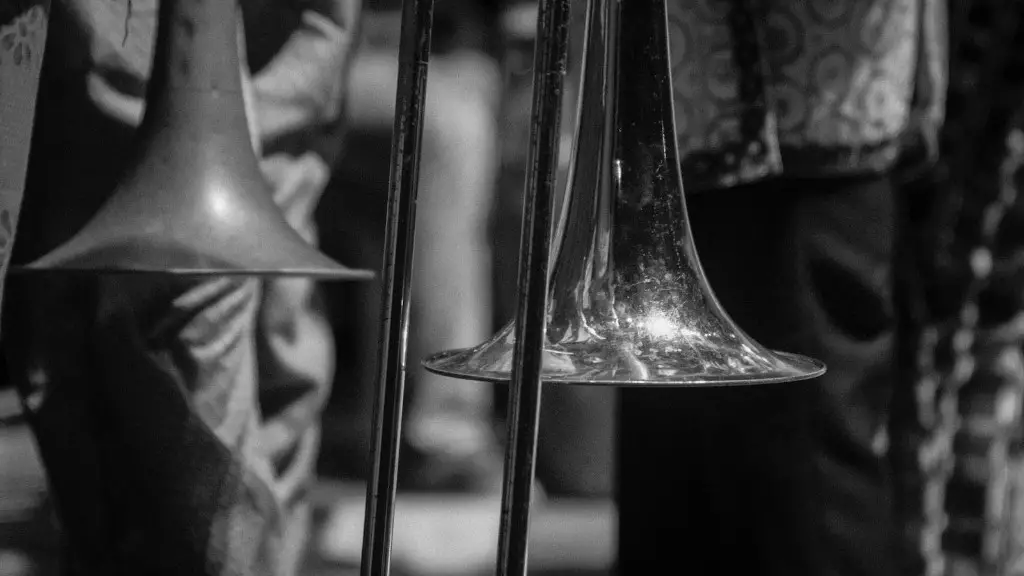Taking care of your trumpet is essential if you want to ensure that it is in good condition and that it will last you a long time. Proper care will help to maintain the quality of sound produced and prevent damage. This article will provide you with some tips on how to take care of your trumpet.
The first step in caring for your trumpet is to keep it clean. It’s important to clean the instrument regularly, especially after each use. Wipe down the body and slide of the trumpet with a lint-free cloth. You should also use a brass polishing compound or oil on the slides and valves.
It’s also important to lubricate the valves occasionally. This will help them move more freely and reduce wear and tear. To do this, put some valve oil onto a cloth and gently rub it onto each valve.
You should also store your trumpet in a temperature-controlled environment with low humidity levels. High temperatures can cause corrosion, while high humidity levels can cause mould growth. Always make sure your instrument is kept in its case when not in use.
By following these simple steps, you can ensure that your trumpet is well cared for, helping you get better sound quality and prolonging its lifespan.
How to Store Your Trumpet
Storing your trumpet properly is key to preserving the instrument and maintaining its sound quality. To ensure the longevity of your trumpet, make sure to use a soft pouch or cloth to cover it when not in use. Avoid storing it in extreme temperatures, such as in a hot car or cold basement. It is also important to make sure your trumpet is completely dry before storing, as moisture can cause the valves to corrode or stick. Before storing, clean off all dirt and fingerprints with a soft polishing cloth and apply a thin layer of valve oil on the valves. In addition, make sure all slides are lubricated with slide grease for easy movement.
Regular maintenance and servicing will also help preserve the quality of your instrument. Have an expert inspect your trumpet’s valves and slides every few years for any potential issues that need to be addressed. This will help keep your instrument in top condition, ensuring that you have the best sound quality when playing.
How to Assemble and Disassemble Your Trumpet
Taking care of your trumpet is essential for it to remain in good condition. To assemble a trumpet, start by inserting the main tuning slide into the lead pipe and securing it with a tuning slide stop. Then, attach the mouthpiece to the lead pipe and tighten it firmly. Next, hook up all three of the valves and move them up and down a few times to make sure they work properly. Finally, attach the bell to the lead pipe and secure it with a bell nut.
To disassemble your trumpet, begin by loosening the bell nut and removing the bell from the lead pipe. Then, carefully unscrew the mouthpiece from the lead pipe. Next, take out all three valves one at a time and place them in their respective valve casings. After that, remove the main tuning slide from its slot in the lead pipe. Finally, store all pieces safely in their cases when not in use.
Maintaining proper trumpet care is an important part of ensuring your instrument is functioning correctly at all times!
How to Handle and Carry Your Trumpet
Playing the trumpet requires proper maintenance and handling of the instrument. To ensure that your trumpet is well cared for, it’s important to understand the basics of how to handle and carry it.
When picking up your trumpet, always make sure to hold it securely. Place one hand on the bell of the instrument and use your other hand to support the weight of the valve section. Always lift with both hands and avoid dropping or throwing it.
When transporting your trumpet, make sure you have a secure case that fits properly so that nothing can move around inside. Don’t forget to cushion fragile parts with soft cloths and secure them with straps or ties.
Finally, when you’re done playing, it’s important to clean your trumpet regularly. This will help prevent corrosion, which can damage valves and slides. Use a cleaning rod with a cloth or brush attachment to remove dirt from inside tubing and moisture from the slides. Wipe down outside surfaces with a soft cloth as well.
How to Change the Valves on Your Trumpet
Caring for your trumpet is important for keeping it in good condition. One of the most important maintenance tasks is changing your valves. This process can be done quickly at home with the right tools and supplies.
First, you will need to gather all of the necessary supplies, which include valve oil, valve casing gaskets, and a valve box wrench. You may also want to have a soft cloth handy for cleaning the valves.
Next, take off the bell of your trumpet and unscrew the valve casings. Once they are removed, use your cloth to clean any dirt or grime from around the valves. Then apply a small amount of valve oil to each valve before replacing them in their casings with new gaskets.
Finally, use your valve box wrench to securely tighten the casings back onto your trumpet. Be sure not to overtighten them as this could cause damage. Once everything is properly secured, play a few notes on your trumpet to make sure everything sounds right.
By following these steps, you can easily change out your trumpet’s valves at home and keep it in tip-top shape!
Checking for Dents and Bumps on a Trumpet
Playing the trumpet can be a lot of fun, but it’s important to take care of your instrument. One of the key parts of caring for your trumpet is checking for dents and bumps. You should check for these every few months, or whenever you notice something out of place.
To check for dents and bumps, hold the trumpet up to a light source and inspect the exterior. Any dents or bumps will be clearly visible in the light. If you find any, you should use a soft cloth to carefully buff them out. It’s important to avoid using anything abrasive or metal that might scratch your instrument.
You should also look closely at the tuning slides and valves as they are more prone to damage than other parts of the trumpet. Make sure they move freely without sticking or any type of resistance when being turned. If there is resistance, try lubricating them with a small amount of valve oil. This will help ensure that your valves are working correctly.
Overall, it’s important to regularly examine your trumpet for dents and bumps as they can affect its sound quality and performance. With proper care and maintenance, you can ensure that your trumpet is in top condition at all times!
Lubricating the Valves on Your Trumpet
Lubrication is one of the most important parts of trumpet maintenance. Keeping your valves lubricated keeps them operating smoothly and helps to prevent stuck valves and other problems. To properly lubricate your trumpet valves, start by removing the valve caps and casing. Apply a few drops of valve oil to each valve, then reassemble the casing and valve caps. Use a soft cloth to gently wipe off any excess oil that may have spilled out during application. It’s important to use only a high-quality valve oil, as this will help ensure that your trumpet operates optimally and lasts for years to come.
It’s also important to clean out any dirt or debris that may have collected inside the casing and on the valves themselves. This can be done using compressed air or a small brush, depending on how much debris has built up over time. Make sure you take care not to cause any damage while cleaning, as this can lead to further issues with your trumpet’s performance later down the line. Finally, remember to regularly check your trumpet’s valves for signs of wear or damage, as this can also affect their performance. Taking good care of your instrument will ensure it plays beautifully for years!
Final Words
To take care of your trumpet, you must maintain proper hygiene, use the right cleaning materials, store it correctly and have regular maintenance done by a professional. After playing your trumpet, make sure to wipe it down with a soft cloth to remove any saliva or dirt. With consistent care and attention, your trumpet can last for many years. Proper care will help ensure that your trumpet plays its best for many years to come.
In conclusion, taking care of your trumpet is essential if you want it to last and produce beautiful music. With proper cleaning and storage, you can keep your trumpet in good shape for many years. It’s important to take the time to clean and maintain your instrument regularly so that you can enjoy it for a lifetime.





